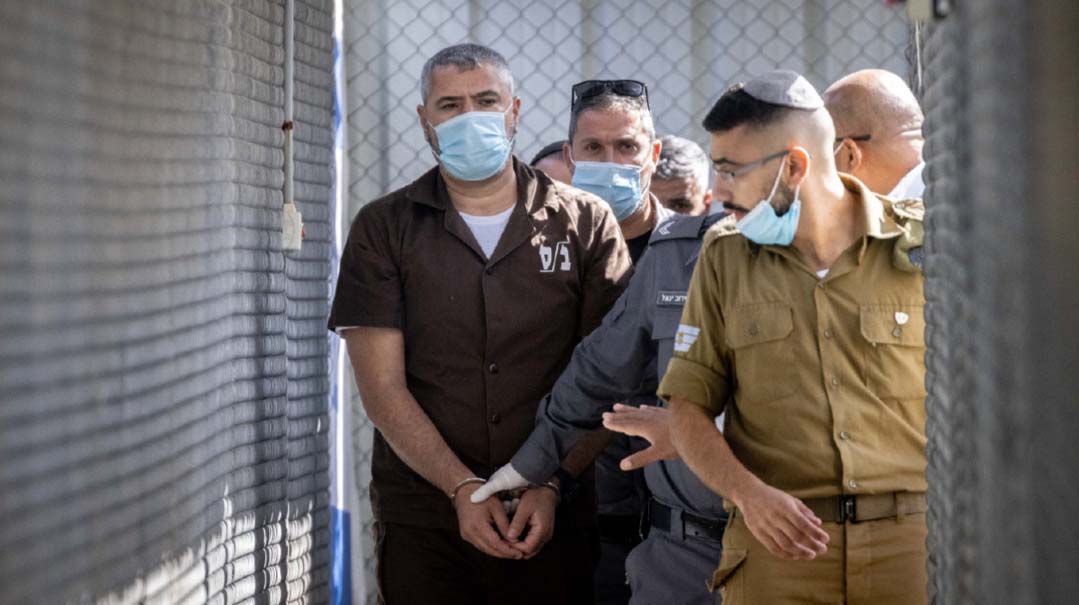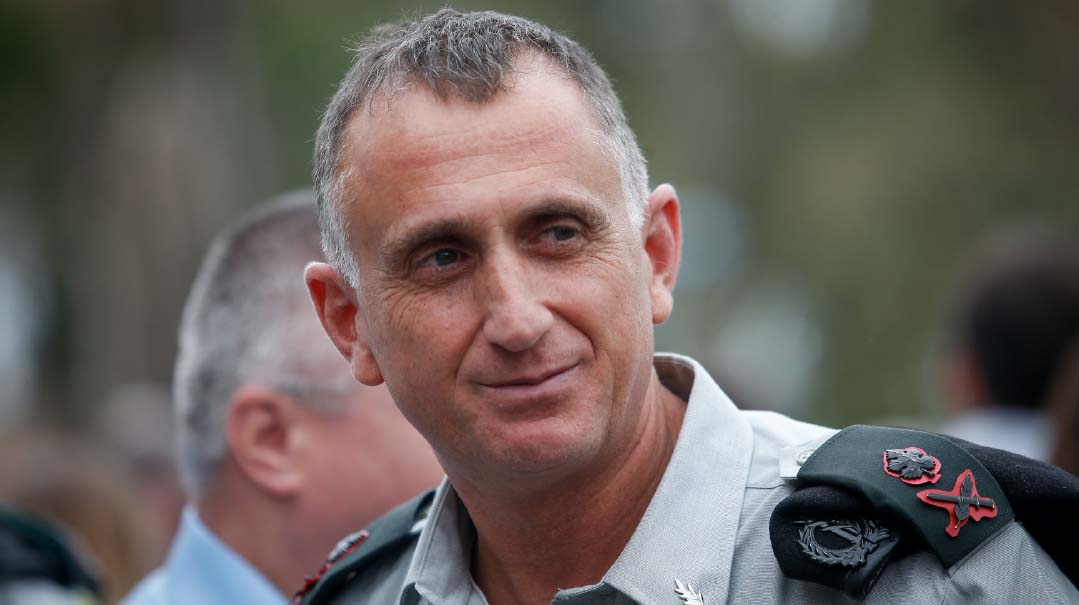Big Hamas Terror Op Thwarted

The planned massive attacks during the chagim were to have been carried out with help from Hamas in Gaza

The Israeli security establishment uncovered the largest Hamas terrorist network in the West Bank in 15 years last week, and is now waging a war there to eliminate it.
Hamas, based in the Gaza Strip, saw its terrorist infrastructure in Judea and Samaria dismantled and destroyed in the Second Intifada, which cost over a thousand Israeli lives. But recently it began quietly been laying the groundwork to mount a Third Intifida, assembling two large cells in the West Bank totaling over 30 terrorists.
The IDF and Shin Bet uncovered a Hamas plan to use the cells to launch a series of massive terrorist attacks in Jerusalem and across the country from Judea and Samaria, during the chagim. This discovery took place amid a spate of lone-wolf attacks in the West Bank over the past few weeks, most of which were foiled b’chasdei Hashem.
The planned massive attacks during the chagim were to have been carried out with help from Hamas in Gaza. The planning and preparation took place with the utmost secrecy. During the captured terrorists’ interrogation by the Shin Bet and IDF throughout the week, it became clear that only open miracles prevented the elaborate scheme from coming to fruition.
Lone-wolf attacks continued late last week even as remaining members of the Judea and Samaria terrorist cells were hunted down. Of the terrorists, some 20 were arrested last week, while 12 more, all members of Hamas or Islamic Jihad, were eliminated when they resisted arrest, opening fire on Israeli troops.
The Hamas network was uncovered accidentally a month ago and watched closely since. The IDF discovered large stockpiles of guns and ammunition during its raids. Six of the terrorists who were killed came from Biddu, a village near Ramallah, which the security establishment has classified as a ticking time bomb.
“The Biddu sector has been fairly calm over the past 15 years — it isn’t a village that’s considered a typical hideout for Hamas cells,” says Lieutenant Colonel (res.) Alon Evyatar, an expert on the Palestinian sector and the former advisor to the coordinator of Government Activities in the Territories. “Due to its proximity to the heavy Israeli security presence surrounding Jerusalem, Hamas feels less safe there. It didn’t often appear in our lists as a terror hotspot.”
Evyatar explains that Hamas’s military wing tends to keep its command structures decentralized, with operatives only knowing a small circle of their immediate accomplices. The terrorists arrested last week were working in two separate teams in relatively distant parts of Judea and Samaria. The purpose of this was to ensure maximum secrecy and avoid detection.
Since the end of the Second Intifada 15 years ago, Hamas had not been able to maintain a centralized headquarters of its military arm in Judea and Samaria to directly control local networks. Per the security establishment’s assessment, the decline of the PA’s authority in Judea and Samaria over the past two years has made it hard for Palestinian security forces to act in sensitive sectors, in particular in the areas of Jenin and Chevron.
The Palestinian security forces’ prolonged inaction led to the founding of armed groups of locals in these areas. In the Jenin sector, the armed bands are centered in the villages of Burqin and Qabatiya, and in the Chevron area are spread out throughout the countryside. At this stage, the PA feels that the use of force against these gangs will be perceived as illegitimate by the Palestinian public.
The detection of the cells provides a glimpse into one of the more complicated aspects of the dangerous war on terror carried out by IDF forces in Judea and Samaria: guidance from Hamas in Gaza. While it’s relatively easy for Hamas members to carry out terror attacks from Gaza, in Judea and Samaria their capabilities are much more limited due to the Shin Bet’s presence and the fear of the Israeli response. The current effort was directed by Hamas in Gaza, where it is the sovereign authority and can employ advanced, lethal capabilities.
A security source I spoke to this week says, “Jenin, which in recent years went from being the capital of terror to a flourishing town, has not relinquished terror, and this could affect the Palestinian street as well as the situation in Israel.” He added: “Hamas never stopped directing terrorist activities and attempting to form terror cells and networks in Judea and Samaria.” He adds that they use civilians as human shields to forward those aims.
Hamas’s growing presence in the area spurs Palestinian youth to join the terrorist movement. The security establishment has expressed concern that the terror group invests in inculcating their radical ideology among the youth from the earliest ages, encouraging them to go out and confront IDF forces.
The security establishment sees cooperation with the PA as crucial and as a shared interest for both Israel and the PA. However, Hamas is taking advantage of events, including the lingering tension from Operation Guardian of the Walls, to attack the security cooperation. “The fatalities are the direct result of the continued security cooperation and the desire for normalization. The PA must cease its military cooperation with Israel without delay,” Hamas spokespeople said.

A Spy’s Work Is Never Done
On the desk of Major General Tamir Heyman, head of the Military Intelligence Directorate, lies an interesting document. He briefly shows us a section of it. We make out the words “Anaconda,” “Soprano,” and “Jojoba” — code names for spies the Directorate employs in hostile countries.
“It was a lot of hard work to win over Jojoba, he took us years,” he says.
Such sources as these make it possible to collect and analyze useful intelligence that saves lives. Heyman, who has been in his job three and a half years, spoke to military reporters recently in his office.
“This is a complicated time and there’s not a single sector, near or far, where we aren’t in action,” he said. “In this job, every minute counts. It’s the most important, complex, and demanding position I’ve held in my entire career. You can feel your impact on the decision making and bring about real change.”
A particular area of focus of late has been disrupting the money supply behind terrorism. The Military Intelligence Directorate and the Shin Bet have formed joint task groups to prevent monetary transfers for financing terrorism in the region.
“We realized that that’s one of the most effective ways to fight back,” Heyman said. “We passed along intelligence that led to senior officials of Iran, Hezbollah, and Hamas being added to the US Treasury Department blacklist of money launderers.”
Heyman said his agency has also participated in the actions against Iranian oil shipping that have led to increased tensions in the Persian Gulf.
“In these operations at sea, 12 tankers have been damaged, which led to an open naval war with Iran striking back at Israeli-owned ships in the Gulf in an effort to deter us,” Heyman said. “Incidentally, this operation blocked the transfer of $2 billion worth of oil to countries supported by Iran.”
(Originally featured in Mishpacha, Issue 880)
Oops! We could not locate your form.






